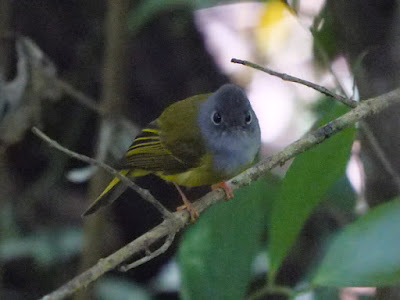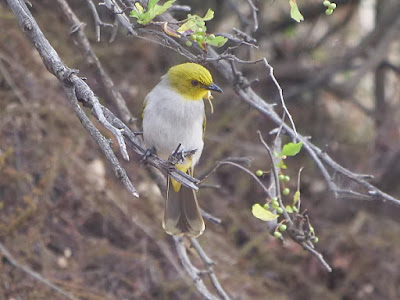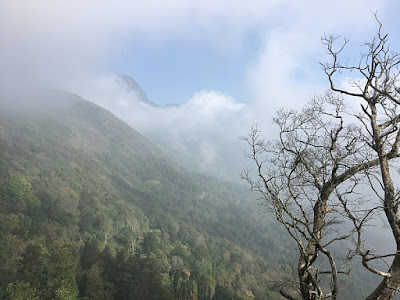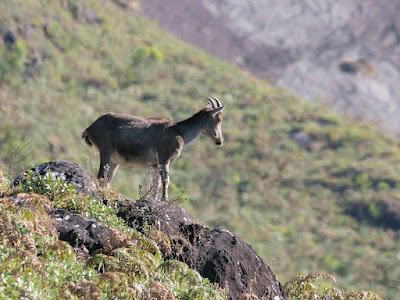This is the fourth of five blogs covering a Tansa, South Andaman and South India trip with Nick Preston and Paul Noakes. It has been enhanced with some of Paul's excellent photos. Despite some inclement weather we'd had a very successful few days at Thattekkad with our excellent guide Jijo Mathews and now it was time to move on.
Wednesday 25 January. The heavy rain continued raining during the
night but had stopped by dawn. We left Birds Murmur Camp at 06:30 only to
return 5 minutes later when Paul realized he’d left his camera in the dining
area. One of the employees was waiting with it in the car park.
Although it had stopped raining the low cloud was slow to clear and only did so
towards the end of our 25 minute hornbill search. We saw 20+ Malabar Grey Hornbills on the opposite
side of the river but no Malabar Pied flyover. We continued to the Salim Ali
trail where, after a short wait for Jijo to purchase tickets, we walked to the
area we’d seen the rufous morph Oriental Scops Owl two days before but couldn't relocate it. Nearby I has a view of a
pitta shape in my thermal imager but couldn’t locate it through bins and it had
gone when I tried the imager again - Indian Pitta TIO. We left Thattekkad at
08:50 for the drive to Thekkady. It was a slow road and our bus made the journey
seem even slower but, with a stop for a Black Baza that disappeared before most
of us had identifiable views and another for breakfast, we made it by 13:00. We
had a really nice, really large room at Wildernest Bed & Breakfast, the
only disadvantage being that they don’t start the latter until 07:30 and we would have to leave before 07:00. We
entered the nearby Periyar Tiger Reserve just before 14:00, signed a liability disclaimer should we be
attacked by a Tiger, were assigned a park ranger to act as guide and given leech
socks (which proved unnecessary). There followed an absolutely brilliant
afternoon in open woodland with scattered undergrowth. In approximate order and fairly quick succession we saw 2 Malabar Woodshrikes, a male Grey Junglefowl, Common Hawk-Cuckoo, a flock of 6 Wynaad
Laughingthrushes, Malabar Whistling
Thrush and 3 Indian Scimitar-Babblers. Further into the park we added a female Malabar Trogon, Malabar Flameback and Imperial Pigeon (both very recent splits we had not been fully aware of), 2
grey-morph Oriental Scops Owls
(brilliantly located by Paul), Orange-headed
Ground Thrush and Indian Blackbird. Just before we left at 17:45 we crossed paths with the Wynaad Laughingthrushes again as they were going to roost. That evening Nick and Paul went for an Indian
meal while I bought bread, cashew nuts and dates to make sandwiches.
 |
| unsuccessful hornbill watch at Thattekkad |
 |
| our large room at Wildernest B&B, Thekkady |
 |
Crested Hawk Eagle over Periyar (photo: Paul Noakes)
|
 |
| Malabar Woodshrike at Periyar |
 |
| Malabar Woodshrike at Periyar (photo: Paul Noakes) |
 |
| Black-backed Flameback at Periyar |
 |
| Common Hawk Cuckoo at Periyar |
 |
Common Hawk Cuckoo at Periyar (photo: Paul Noakes)
|
 |
| Wynaad Laughingthrush at Periyar, one of a flock of six |
 |
| the main target at Periyar and often tricky to see so it was nice to succeed at our first attempt |
 |
Wynaad Laughingthrush at Periyar (photo: Paul Noakes)
|
 |
Malabar Imperial Pigeon at Periyar
|
 |
a very recent split from Mountain Imperial Pigeon that I/we would have probably not followed up the calls of were it not for Jijo
 | Malabar Imperial Pigeon at Periyar (photo: Paul Noakes)
|
|
 |
| Oriental Scops Owls at Periyar |
 |
both roosting in the same tree
|
 |
Oriental Scops Owls at Periyar (photos: Paul Noakes)
 |
 |
| just as we were leaving Periyar the Wynaad Laughingthrush flock flew across the path |
 |
| Wynaad Laughingthrush at Periyar (photos: Paul Noakes) |

Thursday 26 January. We left Wildernest B&B at 07:00 and drove
the short distance to the park reception from where we squeezed into the last seats on
one of the shuttle buses to the park boat landing area. Groups of visitors
were being ferried across one of the creeks running into the reservoir. One group had just been pulled over by
rope when we arrived and the raft was on its way back. We watched a smaller
group go but when the ranger on our side tried to pull it back again the rope came away leaving
the raft on the other side. With attempts to resolve the situation failing, 2 or 3 groups in the queue ahead of us and it already gone 08:00 we opted
to walk in the open forest on our side. It was reasonable looking habitat despite a bit less undergrowth
than yesterday’s session at Peryiar but rather disappointing bird wise. We were
back at 10:00 having seen male Malabar
Trogon, at least 2 each of Malabar
Flameback and Heart-spotted
Woodpecker and a Wild Boar. Sitting in the empty bus ready to return I asked
Jijo if we were allowed to walk back as it had only taken 10 minutes in the bus
through mostly good habitat. He said yes and we disembarked,
Jijo deciding to join us, despite our saying it wasn’t necessary. Walking was a
good option, particularly for me, as we saw male Grey Junglefowl, Orange-headed
Ground Thrush, Blue-faced Malkoha
(new for me) and White-rumped Spinetail
(I'd only seen 2 before, in 1979). We also saw another Wild Boar and
several Samba. We were met by our minibus at the outskirts of Thekkady at 12:15
and were back at Wildernest B&B a few minutes later. We left again at
14:30, picked up a different guide and drove a km or so into the park to the
place we’d been picked up the previous evening. We walked more directly to
where we turned back previously and continued for km or two before returning.
We saw a perched Black Baza (new for
Paul but distant and against the light so not ideal), 3 Oriental Scops Owls (the head of a brownish looking individual in a
hole in a broken branch and the 2 greyish birds from yesterday, this time
together), Jungle Owlet, Malabar Imperial Pigeon, another male Malabar Trogon, Black Eagle, 2 Rufous
Woodpeckers, 2 Elephants, 2 Wild Boar and 15+ Gaur. I saw another Jungle
Owlet from the bus on the way back although it was virtually a silhouette, and
a male Grey Junglefowl approaching the large bamboo stand on the edge of
town.
 |
| the ferry being pulled across the creek |
 |
| stranded |
 |
| Heart-spotted Woodpecker at Periyar |
 |
| extracting a grub |
 |
Heart-spotted Woodpecker at Periyar (photo: Paul Noakes)
|
 |
| Malabar Parakeets at Periyar |
 |
| Nick, Jijo, our partially hidden park guide and Paul stopped for breakfast at Periyar |
 |
| female Malabar Flameback at Periyar |
 |
| she was soon joined by a male |
 |
| who started to display |
 |
| hollowed out dead tree |
 |
| nothing appeared to be roosting in it |
 |
| open woodland at Periyar |
 |
| the lake at Periyar |
 |
| Tamil Yeoman at Periyar, the recently chosen State Butterfly of Tamil Nadu |
 |
| Orange-headed Ground Thrush at Periyar |
 |
| Blue-faced Malkoha at Periyar |
 |
 | Blue-faced Malkoha at Periyar (photo: Paul Noakes)
 | White-rumped Needletail at Periyar (photo: Paul Noakes)
|
|
|
 |
| Nilgiri Langur at Periyar |
 |
| Bonnet Macaque at Periyar |
 |
roosting Indian Scops Owl at Periyar
 | Indian Scops Owl at Periyar (photo: Paul Noakes)
|
|

Jungle Owlet at Periyar (photo: Paul Noakes)
 |
Jungle Owlet at Periyar about to fly, me too slow again
|
 |
| Black Baza at Periyar - into the sun and on the opposite side of the valley |
 |
| Gaur at Periyar |
 |
Malabar Starlings at Periyar
|
 |
| the Oriental Scops Owls were roosting in the same tree, one in almost exactly the same spot |
 |
look no ears - Oriental Scops Owls at Periyar (photos: Paul Noakes)
 |
 |
| White-bellied Treepie at Periyar (photo: Paul Noakes) |
Friday 27 January. We left Periyar at 05:45 and drove north before turning west towards Munnar. The road started to climb above the plains into the Bodi Ghat and at about 07:30 we stopped by a slightly more rocky section of the road to look
for Yellow-throated Bulbul. We saw 2
almost immediately - if birding was always this easy! The road continued climbing with the hillsides above increasingly hidden by low clouds. We stopped at a roadside restaurant
for breakfast which doubtless had a spectacular view on a clear day but not this
morning. We continued zig-zagging up to pass and started down the other side
where we suddenly encountered stationery traffic. A sit-down protest around the next bend
had brought traffic to a halt in both directions. It had been going on for over
an hour and was to do with elephants that had been moved off tribal lands and were encroaching on the local village fields where they had killed a villager the previous week. The protesters were wanting the government to move the elephants somewhere else, at least that was our understanding of the situation. The only alternative route to Munnar was to
return almost to Periyar which would take over 4 hours. While we were waiting someone in uniform
arrived, possibly to hear the complaint, and Jijo felt that the protest
wouldn’t last more than a couple of hours. As it was then less than two hours to Munnar it seemed sensible to give it at least that long before retracing our route. After almost an hour we decided to continue
walking – it was downhill and the road ran through patches of forest. Passing
the protesters, all those sitting down were women and a few waved as we went
by, and continuing down the road we saw 4-5 Indian
Black-lored Tits, 2 Nilgiri
Flycatchers, and 2 Square-tailed
Bulbuls. The tit and flycatcher were my first
‘protest ticks’. We’d gone maybe a km when traffic started coming down behind us, first
motorbikes, the saloon cars and then our vehicle. We continued to Munnar, up
and over another ridge into tea growing country. The last part of the journey
was along a tortuous dirt track, necessary as our vehicle was too high to
pass under the barriers where the main road to our part of town crossed a barrage . We arrived at Olive
Brook, a somewhat secluded hotel on the edge of town, at 13:45. We had a late
lunch and left at 15:15 to walk around above the town and back along the
entrance road, returning just before dusk. On the way out and back we checked a ravine by another guest house where Jijo had sometimes seen Nilgiri Thrush. No luck but there were a few people wandering around which wouldn't have helped. Birds we did see included Palani Laughingthrush, female Indian Blue Robin, 4 Nilgiri Flycatchers and 2 Nilgiri Wood Pigeons. Back at the hotel things were looking up on the catering front - I had my first chips of the trip and a piece of yummy plum cake.
 |
| village protest, I hope the elephant situation was resolved |
 |
| tea plantations approaching Munnar |
 |
| Nilgiri Flycatcher at Munnar |
 |
| Palani Laughingthrush at Munnar (photo: Paul Noakes) |

 |
| Crimson-backed Sunbird at Munnar |
 |
Square-tailed Bulbul at Munnar (photo: Paul Noakes)
|
 |
Orange Minivet at Munnar (photo: Paul Noakes)
|
 |
| Red-whiskered Bulbul at Munnar |
 |
| Grey Wagtail at Munnar |
 |
| Nilgiri Wood Pigeon at Munnar |
 |
| Nilgiri Wood Pigeon at Munnar (photo: Paul Noakes) |
 |
| poor visibility disappointed the locals waiting for the sunset |
 |
| tea plantations on the edge of Munnar |
Saturday 28 January. We left Olive Brook at 06:55 after a 10 minute look at
Jijo’s thrush site but drew another blank, not helped by some cars being washed
right by it. We had a 15 minute drive on the rough road, avoiding the barrage height barrier, before joining the main road. We arrived at the Eravikulan
National Park entrance at 07:40, 20 minutes before the ticket office opened and
the first park buses started up the mountain. We were on one of the first buses
which took us up to a terminal and a restaurant, a journey of about 10 minutes through tea plantations before reaching more natural grassland and Shola. From behind the restaurant toilets, looking into a gulley below, we soon saw White-bellied Blue Robin, Malabar Whistling Thrush, a brief Palani
Laughingthrush and Indian Blackbirds. We joined a steady stream of visitors continuing up the
track and soon saw a distant Nilgiri Pipit, better views were to follow, and a
flock of Nilgiri Thar. The track ended at about 1900m near a small patch of
Shola where we saw another White-bellied
Blue Robin, more Indian Blackbirds
and a Blue-capped Rock Thrush. We
walked back down, against an increasing stream of visitors coming up, and after
a short wait for a park bus were back at the entrance at 11:10. It was now
exceptionally busy, being a Saturday and with the park closing at the end of
the month not helping. Once in our minibus we continued a few kms up to a pass,
with cars parked and sometimes double parked end to end along the road for at
least the first km. At the pass we checked a couple of gullies where Jijo had
previously seen Nilgiri Thrush, though at dawn rather than in the middle of the
day. We headed back down towards Munnar but hit solid traffic just before the
park entrance. It was then a very slow stop-start journey with at times batches
of traffic being held up one way to let by a batch coming the other way. Just
as this was thinning out we reached the turning to the Government UP School at
Kannimallay and stopped. I realized this was where Shashank’s Rockjumper tour
had seen Nilgiri Thrush and wondered why we’d not had a look early morning on
our way to Eravikulan. We found a place where we could look down into a
forested gulley at a small pool in an almost dried up stream. This seemed ideal
for Nilgiri Thrush but despite intently watching it for the best part of 5
hours, with Paul doing similar nearby, we failed. Jijo calling
us away at 17:10 was disappointing as it seemed to be livening up and we felt
the best hour of the day for thrushes was about to start. Unfortunately we'd been seen and he’d been
told we should move on, as the nearby primary school - not that we ever saw it - was a particularly sensitive area. During our time there we
saw Slaty-legged Crake, Emerald Dove, White-bellied and Indian Blue Robins, Palani Laughingthrush, Indian
Blackbirds, Large-billed Leaf
and Blyth’s Reed Warblers, Nilgiri Flycatcher and a Blue-capped Rock Thrush. Best of all
and a strong contender for Bird of the Trip (along with Sri Lanka Bay Owl) were a superb pair of Black and Orange Flycatchers. We were
back at Olive Brook by 17:45, rather early in our view although somewhat made
up for by seeing Brown Hawk Owl
before dinner.
 |
| Indian Scimitar Babbler at Munnar (photo: Paul Noakes) |
 |
| male Common Rosefinch in the car park at the Eravikulan National Park entrance |
 |
| Red-whiskered Bulbul from the car park |
 |
| Jungle Striped Squirrel behind the toilet block at Eravikulan National Park |
 |
| most of a Palani Laughingthrush, just not the most important part, behind the toilet block. Unfortunately the leaking sewage pipe which had made the area so good for skulkers had been repaired but it probably smelt nicer! I was very keen to see this species as I share its latin name Montecincla fairbanki although I prefer it's previous name of Kerala Laughingthrush. Unfortunately the |
 |
| male Indian Blackbird behind the toilet block |
 |
| a female was there too |
 |
| Nilgiri Whistling Thrush in a nearby Shola patch |
 |
| Eravikulan National Park |
 |
| a mixture of grassland and Shola |
 |
| Nilgiri Tahr at Eravikulan National Park |
 |
| me at Eravikulan National Park |
 |
| a very obliging White-bellied Blue Robin in a Shola patch |
 |
White-bellied Blue Robin at Eravikulan (photo: Paul Noakes)
|
 |
Nilgiri Pipit at Eravikulan National Park
|
 |
| back at Eravikulan National Park entrance the crowds were increasing |
 |
| not as nice as this one though |
 |
| female Black and Orange Flycatcher at Kannimallay |
 |
| male Black and Orange Flycatcher at Kannimallay |
 |
| Black and Orange Flycatchers at Kannimallay (photos: Paul Noakes) |
 |
| female Common Rosefinch at Kannimallay |
 |
| Palani Laughingthrush at Kannimallay, hardly an improvement on my earlier image |
 |
| Malabar Whistling Thrush at Kannimallay |
 |
| Malabar Whistling Thrush at Kannimallay (photos: Paul Noakes) |
 |
| Brown Hawk Owl at Munnar |
 |
| Brown Hawk Owl at Munnar (photo: Paul Noakes) |



























































































































































No comments:
Post a Comment
Note: only a member of this blog may post a comment.